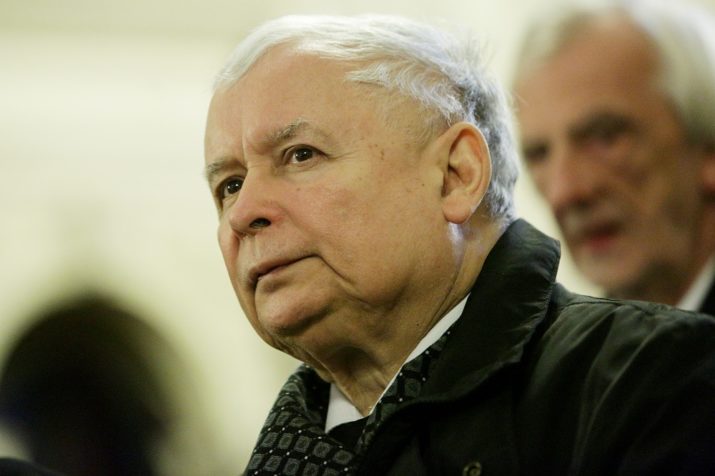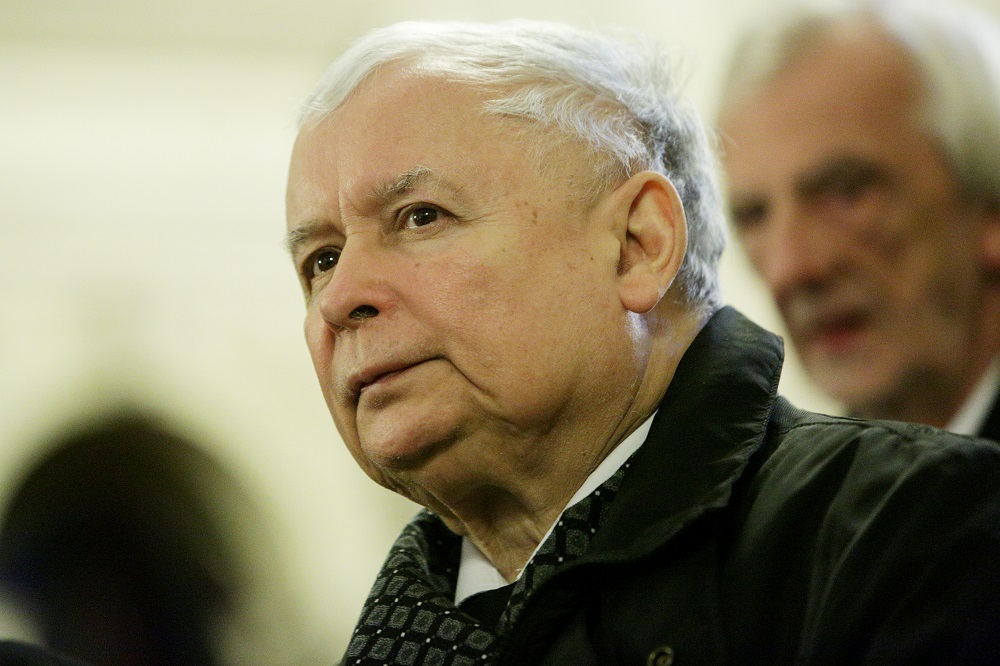

This is part of our special feature on Nationalism, Nativism, and the Revolt Against Globalization.
Among numerous questions that have been posed after recent electoral successes of conservative, right-wing, populist parties at least one seems to be repeated ad nauseam: “Who voted for them?” Whether this question is asked at a dinner among friends, an academic conference, or a business meeting, it tends to provoke a somewhat comforting reaction: those who committed “such terrible electoral mistakes” were misled, driven by emotions (usually “anger” and “fear”), and deluded by hopes of economic gains. It is comforting because it suggests a divide between the naïve and ignorant supporters of the “new right” and their enlightened opponents, yet it is also comforting because it implies that the first group will see through as soon as emotions cool down and electoral promises vanish. In Poland, the latter suggestion has been so strong among the centrist/liberal political opponents of the current government that two years after the victory of “Right and Justice” (Prawo i Sprawiedliwość, PiS) they still seem to consider the current government to be a temporary aberration.
“Aberration” is a crucial term in this context. As I want to suggest in this short essay, at the heart of many conflicts that cut across contemporary societies lies a struggle over understanding, and establishing, what counts as “normal.” Drawing on the example of Poland, I hope to contribute to the reflection on the causes of the current status quo – by which I mean the growing popularity of right-wing populist parties and nationalistic rhetoric – by moving away from discussing the revolt against (as well as “victims” and “contestators” of) “globalization.” Notwithstanding the power of “global forces” – whether understood as market, culture, or ideology – that have profound consequences on most locales around the world, I contend that empathetic pictures of laid-off workers whose factory has moved to China or accounts of people seeking refuge in their “local identities” due to a fear of cultural homogenization do not lead us to a better understanding of the revival of nativist/nationalist ideologies. I thus aim to bring the discussion to a more concrete level, at the same time hoping that Poland-specific examples will shed light on a broader European context. I focus on two discursive mechanisms – “scorn” and “shame” – which I understand, following Pierre Bourdieu, as attempts to establish what is “correct” and “normal.”[1] I use them to demonstrate a long and complex strain of nationalist(ic) orientation in the Polish politics, broadly understood, which the victory and the rule of PiS brought to the surface. This illumination of examples specific to Poland will, I hope, also shed light on broader European trends.
PiS came into power in the fall of 2015 after eight years of rule by the Civic Platform (Platforma Obywatelska, PO), dominated by a discourse of Polish economic success (in the main, the development of infrastructure thanks to EU funds) and characterized by a quite arrogant approach and considerable ignorance when it comes to the everyday realities of most Polish citizens. Weakened by tensions between its conservative and liberal wing, the party did not fulfill many of the promises made to either group of the voters – those hoping for more liberal policies in terms of, e.g., civil unions and reproductive rights, and those demanding Church-friendly, traditionalist policies. Consequently, PiS rode a wave of discontent with the PO government to power, presenting itself as a defender of “national interests” and countering the discourse of Polish economic success with the promises of more equitable distribution of wealth. It also took advantage of the refugee crisis, spreading a narrative linking terrorism and migrants that would be familiar in many European contexts.
Having begun its rule with the introduction of the promised, and widely popular, social programs, PiS began an attack on numerous institutions, from the courts, through state TV and radio, to schools, theaters, and museums. In doing so, it has violated the constitution, encroached on the separation of powers, and, having carried out a moral campaign against corruption and nepotism, proved to be extremely efficient in substituting anyone considered to be either a government critic or a person connected with the former regime by PiS-friendly personnel. Crucially, “the former regime” is often understood in broad terms and includes politicians, intellectuals and public figures who have alleged links to the communist system and/or who benefited from the post-communist transformation.
Still, what often escapes in current discussions is the recognition that the two parties, PiS and PO, do not differ substantially in terms of ideological orientation, a fact at least partly illustrated by the number of members switching between the two (as well as conveniently forgotten). Members of both parties originate from the Solidarity movement; both of them are right-wing and socially-culturally conservative; and when decrying the PiS design of school programs or cultural politics, it should be pointed out that PiS is bringing to the extreme programs or ideas which, by liberal or left-wing standards, were already far from progressive. I shall return later to a crucial difference, the fact PiS eroded democratic norms in a way that PO never did, but for the moment will address another issue: why do most Polish citizens now choose PiS over PO?
Many people in and outside of Poland undoubtedly imagine an “ideal type” of a PiS voter, reinforced by press images from pro-government demonstrations, which differ substantially from those presenting the government’s critics, in that these two kinds of images tend to correspond with the scheme old/young, modern/old-fashioned, urban/rural. A PiS voter is usually portrayed as a middle-aged man in a polyamide raincoat and old-fashioned ivy cap, with an angry look on his face; or as an elderly woman in cheap fur and a rosary in her hand, surrounded by dozens of identically looking peers. The argument that such images simply reflect the demographics of the government’s supporters does not really hold if we look at the electoral or opinion poll results, which clearly demonstrate PiS’s victory among all the population strata. The numbers differ and PiS does indeed have more support among uneducated people and inhabitants of small towns; but what too often escapes attention is the increasing number of PiS voters in big urban areas, and with higher education. To illustrate this point: in 2011, 48 percent of people with higher education voted for the PO and only 22 percent for PiS; in 2015, the figures were 30 percent against 27 percent
Yet, the way in which the government’s critics talk about its supporters is remarkable. They heaped particular vitriol on a program called “Family 500+,” introduced in early 2016 and granting each family with more than one child 500 PLN a month (c. 120 Euro). As soon as the program was introduced, opposition politicians[2] and the mass media launched a scorning campaign targeted at the program’s beneficiaries, that is: lazy, welfare-abusers who “can be bought” as they value the allowance more than they value democratic freedoms.[3] Journalists and opinion-makers insinuated how the money was being used, suggesting that parents use the allowance to buy alcohol (thereby linking poverty with pathology) or demonstrating a very simplistic understanding of “family needs.” In the summer of 2016, they lamented the fact that Polish beaches are no longer as clean and as quiet as they used to be due to fact that many (poor, pathologic) parents could for the first time take their kids to the seaside; their arrival was compared to the Huns’ invasion.[4] Numerous examples could follow, yet these few instances are probably enough to illustrate a remarkable hostility towards one’s own society as well as the continuous process of “internal orientalism,” to use the term coined by the anthropologist Michał Buchowski to describe 1990s-era discourse on the post-communist transformation’s “losers.”[5]
In criticizing either the Polish right-wing parties or their electorate, adversaries often reach for the category of “Europe” in order to demonstrate their backwardness and narrow-mindedness. “What will Europe think?”; “Is ‘500+’ a European shame?”; “Does this move us away from Europe?” are typical preoccupations of the “modern” part of Polish society. For the adjective “European” stands for modern, appropriate, and – yes – normal. There is little reflection on the meaningfulness of certain policies per se, on whether they fit in a specific context, as the main criterion is the degree of the policy’s “Europeanness.” In fact, this is used in an automatic manner even if the evidence does not support the claims; closed shops on Sunday (proposed by PiS[6]) and some form of child allowance are, in fact, a norm in numerous European countries. And there is also the other side of the coin: the opposition’s inclination to emphasize any instance in which actions (protests, votes, etc.) against PiS receive praise “from Europe.” The fact that also within the European Union the situation in Poland spurs mixed reactions is largely neglected. Perhaps the most remarkable example here is the December decision to launch the so-called Article 7 against Poland.[7]
In order to fully understand the importance of such references, other examples of “euro-enthusiastic” discourse are in order. When anti-government demonstrations carry slogans such as “We are the European Poland,” “Jarek [Kaczyński], chap, we are in Europe!” (Jarek, chłopie, jesteśmy w Europie), and “Moving away from Europe means moving East,” they epitomize much more than the criticism of euro-skeptic PiS in that they clearly reflect a strongly rooted inferiority complex and a fear of losing a status that Poland eventually reached thanks to the postcommunist transformation and modernization politics, mentioned above. The idea of moving East embodies this sort of fear, indicating specific, persistent hierarchies: the East is backward, non-modern, and not a part of Europe.[8] Meanwhile, the call directed at PiS leader Jarosław Kaczyński indicates some internal hierarchies, as the term chłop can be understood as both “chap” and “peasant” and as such refers to a stereotypical perception of the Polish village inhabitant as ignorant.
An analysis of this discourse has three important implications for our understanding of PiS’s success. First of all, the tendency to compare Poland to Europe and simultaneous attempts to “please” Europe are something many Polish people grew tired of. Some refute this discourse because they see it as limiting Polish sovereignty; others rebuff it as it resembles too much the situation from decades ago (“what Moscow said”).[9] Yet others reject it because they are perfectly aware that the dichotomist view of “democratic European Union – undemocratic PiS” simply does not hold; this group tends to include the most educated among PiS voters who feel their views are excluded from the mainstream (and especially in their own social circles). Not only do they question the idea of sanctions or criticism against Poland the moment other countries contravene the EU rules, but they contest the fact that any discussion of this aspect is out of the question. In the strongly polarized Polish public sphere, there is no place for such nuances: the choice is between the former “ultra-European” party and the current “ultra-skeptics,” with no room for a fair discussion on both Poland’s gains from EU membership and Poland’s unequal status within EU structures.[10]
This is not to say that PiS refers to Europe only in negative terms. Indeed, my second observation regards the ways in which the discourse of Europe has been appropriated by the PiS regime. The aim in this case is to provide its own vision of Europe that PiS and its supporters truly represent. It is a Christian Europe, a Europe that defends its citizens from various threats (Muslim terrorism, economic immigrants stealing jobs, refugees bringing diseases), and a Europe of sovereign nation-states, connected through (Christian, conservative) values rather than institutions and agreements. And in distancing itself from the EU in its current state, PiS re-inscribes once again what is considered normal and proper: Europe is decadent and anti-democratic, while the Polish government, as democratically chosen representatives of the nation, fights for justice and defends its citizens. In supporting the Polish opposition, by this logic, the EU in fact supports post-communist elites, the people who most benefited from the post-communist transformation and who possess powerful networks and connections. Even though PiS and PO (and many other present-day) politicians were all active in the Solidarity movement and started their careers as parliamentarians in the transformation era, PiS promotes a narrative according to which “good” and “honest” leaders of the transformation have so far been excluded. This narrative is probably one of the most successful tools of PiS power, as it reaches groups as different as conspiracy-theory fans and moderate voters who simply welcome an opportunity to contest the long established, dominant view of the postcommunist order[11] as something “taken for granted” and something every reasonable person accepts (that is: neoliberalism, market-orientation as well as the politics of the “thick line” in relation to the communist era). Their “heterodox views” are thus aimed at exposing the arbitrary; the notion of “heterodox” seems particularly appropriate given that people holding such views tend to perceive themselves as marginalized and silenced.[12]
“We are the Europe,” as understood by PiS, embraces not only Poland, but Hungary and other countries that adopt similar policies. Instead of the notion of shame, they use the notion of dignity that Europe needs to regain.[13] The government camp plays a lot with these two notions in its attempt to provide the Polish society with a new narrative. One of the key aims in the field of culture, education and historical politics is bringing to an end the so-called “pedagogy of shame.” The term indicates precisely what it suggests: instead of acknowledging past crimes committed by ethnic Poles against other citizens, and instead of problematizing and pluralizing dominant historical narratives, present-day authorities, sympathetic scholars and opinion-makers substitute them with accounts of Polish heroism and Polish suffering. Good examples include the new narrative on relations between ethnic Poles and Polish Jews in the twentieth century[14] or attempts to eradicate any remaining traces of the communist era.[15]
The obsession with national(ist) history leads to my third point, namely the long genealogy of the issues discussed herein. As indicated above, PiS has brought to the extreme many longstanding aspects of Polish politics and society. Poland’s obsession with how it is perceived and what role it plays became an object of jokes as early as in the nineteenth century (it was then referred to as “The Elephant and the Polish question”). In the interwar period, the very same obsession was one of the causes of the erroneous foreign policy that weakened Poland’s position at the outset of the World War II. Nowadays, it is familiar to anyone who follows the Polish mass media and struggles to find information about countries other than Poland. Politicians and political figures of all stripes promote various registers of nationalistic thinking, also in its most exclusionary forms. In an earlier publication, I described this phenomenon as “dressed-up nationalism,” suggesting that in contemporary Poland discriminatory, exclusionary discourses pass unnoticed and/or are considered more acceptable due to the fact their vehicles are eloquent, educated, elite figures.[16] Most importantly, however, it needs to be noted that the discourses I discussed above, although different on the surface, derive from, and address, very similar needs: they play on feelings of inferiority, promising better status; they define what is shameful and offer a dignifying tool; they swiftly combine the idea of Poland’s and Poles’ exceptionality and “normalness.” Both these discourses are built on scorn and contempt – against outside world and internal others – and both are highly emotional.
A lot more could be said about both the discourse and the politics of PiS.[17] In this essay, though, I have decided to direct my attention elsewhere as PiS’s language and actions are quite transparent: at the end of the day it is a relatively simple narrative of bad and good, traitors and patriots (described also as “genetic” patriots), the elites and the people. I have thus focused on the language of the “liberal” side to show its weaknesses. Even though this language, regrettably, is often also violent and built on invectives,[18] I consider it to be less transparent in that it has a normalizing effect, enabling to cover up exclusionary tactics and ridiculing mechanisms under very different labels: modernity, prosperity, freedom.
I am aware that the way in which conflicts between different orientations will play out in the following months and years depend not only on the level of self-reflexivity and good will of the actors involved, but also on the structural context, given PiS’s attempts to copy Fidesz’s model of “illiberal democracy” by undermining the legitimacy of basic democratic institutions. Still, I agree with those who warn against describing the situation in Poland in terms of “upcoming totalitarianism”[19]; certain moves of Kaczyński and his followers indeed dangerously resemble the rhetoric of authoritarian regimes, yet predictions on the future which will “surely” bring falsified elections and total censorship means adopting a similar rhetoric to what PiS is using. Such discourse constitutes a comfortable explanation of the opposition’s inaction.
As an academic teacher, I have regular contact with young people and what strikes me whenever I talk to the students in Austria, Hungary, and Poland is the fact they find the popularity of Jarosław Kaczyński or Victor Orbán more understandable than many members of older generations seem to. In talking about the different policies that these politicians introduce, they often conclude with a simple “I understand why this matters.” Older generations have lamented over the fact the youth does not come to the demonstrations in defense of liberal democracy, ignoring the fact many young people simply refuse to march under the logos of the parties they cannot identify with[20] more that they would identify with PiS. The youth I know also refuses to accept the post-communist / neoliberal consensus, even if they would not consider themselves “losers” of globalization or of the post-communist transformation.
Equally striking to me are our conversations about a more radical kind of politics: extreme right movements and parties that, in the view of my interlocutors, should not be dismissed but taken seriously because they do offer an alternative (view, life project, economic model). Young people’s growing recognition of actors at the extremes of the political spectrum characterizes many countries[21] and it is often explained in terms of a search for “authenticity.” Yet this turn towards more radical[22] options does not (necessarily) indicate a desire for radical politics or radical means. When examined closely, it reflects a call for a radical break with the past and a radical reshaping of the political scene. It reflects the inadequacy of the language and categories still used by “mainstream” political parties. Taking this approach is very different from suggesting that “things will go back to normal” as soon as right-wing populists and nationalists-integrists lose elections. It is a call for re-thinking the normal.
Agnieszka Pasieka is a social anthropologist interested in the issues of religious and ethnic pluralism, nationalism, migration, qualitative methodology, and social history. Having obtained an MA in sociology and a Ph.D. in anthropology, she is now a committed ethnographer, and aims to bridge the disciplinary traditions of anthropology, sociology, and history in her research.
Photo: KRAKOW, POLAND – APRIL 18, 2017: Jaroslaw Kaczynski, the leader of the conservative Law in Poland | Shutterstock
References:
[1] Bourdieu, Pierre 1971. “Genèse et structure du champ religieux.” Revue française de sociologie 12(3): 295-334.
[2] Due to space constrains, I cannot discuss in detail the attitudes of different parties. By opposition I mean here the PO and the neoliberal party called Modern (.Nowoczesna), which tend to speak in the same language. The left-wing party Together (Razem) as well as left-wing intellectuals agree with certain social policies introduced by PiS, even though they would propose a different design of such policies, and they are critical of the scorning of the beneficiaries of social assistance.
[3] This argument was used to explain why the PiS government is still popular, despite the fact that it violates the constitution and despite the mistakes it has committed (appointment of controversial ministers, corruption scandals, attempts to limit access to abortion against the majority of the population’s will).
[4] http://www.newsweek.pl/polska/polacy-nad-baltykiem-czyli-najazd-hunow-panstwo-kiepscy-i-mlynarska,artykuly,394671,1.html
[5] Buchowski, Michał. 2006. “Social Thought & Commentary: The Specter of Orientalism in Europe: From Exotic Other to Stigmatized Brother.” Anthropological Quarterly 79(3): 463-482.
[6] PiS presented it in terms of workers’ rights, but the Catholic Church discourse also played a role.
[7] Even those who supported the idea of punishing the Polish government were concerned about whether the introduced sanctions will affect the government alone or the entire society. Others pointed out that numerous other countries contravene the EU law, but Article 7 was never used against them. See, e.g., http://www.lefigaro.fr/vox/monde/2017/12/21/31002-20171221ARTFIG00266-l-injustice-faite-a-la-pologne-un-deni-de-democratie.php
[8] This also points to a larger problem, i.e. the equating Europe and Europeanness with the European Union.
[9] They do not necessarily compare the Soviet regime to the European Union, which is of course a simplistic and unjust comparison; they rather focus on the way that foreign authority is brought up in the discussions.
[10] For an interesting commentary, see an analysis by Thomas Piketty: http://piketty.blog.lemonde.fr/2018/01/16/2018-the-year-of-europe/. To present a full picture, far more data would need to be considered; however, Piketty rightly observes why people “in Warsaw or in Prague” express skepticism towards certain economic tendencies.
[11] They perceive the “postcommunist order” as a set of political and economic ideas, legitimized by milieus (public figures, politicians) that argued in favor of the politics of “thick line” in relation to the communist era.
[12] Bourdieu, Pierre. 1977. Outline of a theory of practice. Cambridge: Cambridge University Press. In light of Bourdieu’s theory, such views might be later naturalized, as a new binding reading of the social world.
[13] One of the most famous speeches by former Prime Minister Beata Szydło, in which she referred to the terrorist danger (and implicitly all “refugees welcome” policies), included the call: “Europe, rise up from your knees.”
[14] This new narrative entails, among others, amplifying the number of ethnic Poles who helped Jews during World War II, and describing the interwar as a time of happy interethnic and interreligious coexistence.
[15] For instance by changing street names, even of people vaguely connected to the communist regime (e.g. writers). In Warsaw, the People’s Army Street was renamed Lech Kaczyński’s street.
[16] http://www.iwm.at/transit/transit-online/dressed-nationalism/
[17] I have not touched numerous important subjects, such as attempts to completely restrict the right to abortion, a series of acts jeopardizing the rule of law, or the inconsistency in fighting hated post-communists, neoliberalism and corruption. Much more could be said also about the language employed by the party and first and foremost its leader: a sort of “new speech,” which ironically resembles that of communist leaders.
[18] I have focused here on attacks on PiS voters, but PiS politicians have also been objects of scorn. Actually, such attacks tend to be offensive in many ways, and towards many groups: consider, for instance, the term „PiSlam.”
[19] For a description of Kaczyński building a totalitarian regime, see: http://www.rp.pl/Rzecz-o-prawie/307299964-Tak-powstaje-dyktatura—jak–PiS–buduje-ustoj-totalitarny.html
[20] Anti-government protests are attended by representatives of most opposition parties, yet it is PO and Modern that tend to play the leading role.
[21] Consider, for instance, young people’s support for Jean-Luc Antoine Pierre Mélenchon or Bernie Sanders.
[22] The idea of the “radical” is of course contextual; it suffices to note that there is a big difference between the US and the European left.
Published on February 1, 2018.




